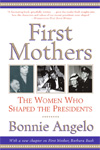Presidential mothers from FDR to Bill Clinton have one thing in common: they invested heavily in their sons. Some loved more unconditionally than others. Many were wealthy and well-educated. And, several were married to abusive men. First Mothers: The Women Who Shaped the Presidents by Bonnie Angelo is one of the most fascinating books I’ve read. Who knew these powerful men were at heart all mama’s boys?

FDR and Sara Delano Roosevelt
Sara Delano Roosevelt: Mother-in-Law from Hell
Franklin Delano Roosevelt, an only child, was the center of his mother’s universe. She lavished him with attention and criticism. The Roosevelts and Delanos were part of the Hudson Valley, New York aristocracy. Her father was an early drug dealer ~ he exported opium from Hong Kong for wounded Civil War soldiers. His father James’ first wife was Helen Astor, whose mother as queen of New York society created the 400 list.
First Lady Eleanor Roosevelt infamously opined, “No one can make you feel inferior without your consent.” Yet, she never enforced boundaries with her mother-in-law who treated her like Cinderella, criticized and belittled her, and engaged in financial abuse to dominate and control FDR’s life and marriage. FDR was “insensitive, even spineless” in supporting his wife:
. . .governor of New York. . .the man who would stare down labor leaders and big business, control Congress, and take on Hitler. But he was unable to say “No!” to his mother. . .
Sara would. . .use her grandchildren as a weapon against Mother. . .she held the purse strings. . .FDR’s lifelong subservience to his mother ~ purse strings entwined with apron strings. . .
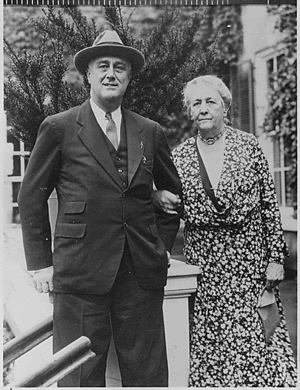
FDR and his mother
Sara had doors cut leading from her large bedroom through Eleanor’s very small one, to give her direct access to Franklin’s room, an unthinkable invasion of privacy. The mama’s boy willingly made his wife second fiddle to his mother.
The elder Mrs. Roosevelt was the first mother able to vote for her son for president.

Martha Young and Harry Truman
Martha Young Truman: Renaissance Woman
Martha Young Truman was 92 years old when she flew for the first time aboard her son’s presidential plane ~ “The Sacred Cow.” She was 29 years old when she married John Truman. Harry was her first surviving son. The Trumans moved to Grandview, Missouri to help run her father’s large farm.
Young Harry was “blind as a bat” without his glasses. His mother taught him to read before he was five years old. He read every book in the Independence (MO) public library. She also taught him to play the piano. She was born into a wealthy family before the Civil War, was college-educated, and celebrated the end of World War II with her son ~ the president. Mother and son were devoted to each other:
His success. . .stems from the wise parenting of a stalwart and uncommon woman, one who had the good sense not to seek perfection in her son. . .She knew that perfect is all too often the enemy of the good.
His father had a volatile temper which was fueled by financial failure.
Harry met Bess Wallace at Sunday school when they were six. They courted for 29 years. Bess, like his mother, was from a wealthy milling family. Her mother Madge lived with the couple for thirty-three cold and critical years:
Throughout her long and crotchety life, Madge Wallace was treated with utmost consideration by the world figure to whom she never showed respect. . .condescension to her son-in-law. . .The president treated her with royal respect at all times. . .Madge’s fine house is now a favorite tourist attraction ~ because Harry Truman lived there. . .at her death Madge’s gentlemanly son-in-law had only kind words for her.
As a young man, Harry lived and worked with Arthur Eisenhower, who had a brother called Ike.

Eisenhower Family
Ida Stover Eisenhower: Pacifist Mother of Allied Commander
Dwight David Eisenhower ~ Ike ~ likely learned how to be a commanding general from his mother Ida Stover Eisenhower, who ably marshaled her sons to complete “unremitting” farm chores in Abilene, Kansas. She deplored violence and taught Ike how to cook, sew, and clean. Although she was a poor orphan, she went to Lane University (where she met her husband) and made a joyful noise with her cherished ebony piano.
Ike’s mechanic father David was somber, withdrawn, morose, austere, brusque, explosive,and antisocial ~ the exact opposite of his wife’s lively, joy-filled personality. Yet, they were devoted to each other and committed to educating their six sons:
Boys are the best investment in the world. . .They pay the biggest dividends. . .our bank. We invested in them every spare penny. . .the investment paid rich returns. All six did well. . .all self-made men. . .prima donnas. . .tyrannical with their own kids.
David, “the czar” of the household. . .focused on obedience and discipline. . .believed in beating his kids. . .Twelve-year-old Dwight, witnessing the merciless beating. . .clutched at his father’s arms. . .”I don’t think anyone ought to be whipped. . .not even a dog!”
. . .Ida was the balance wheel between severe father and resentful sons. . .it was Ida’s values that guided her boys. . .put on a pedestal by her sons. . .Ida knew how to let go.
She became a pacifist in Virginia’s Shenandoah Valley during the Civil War:
When Ida was three years old Confederate soldiers stormed into the Stover home, searching for her fighting-age brothers. . .The harrowing experience. . .took its toll when, two years later, her young mother died; Ida always felt that her mother was a casualty of the war.
Although the Eisenhower family was wealthy, Ike’s father went bankrupt. Since Ike couldn’t afford to pay tuition, he went to the U.S. Military Academy at West Point. Ida hoped Ike would become “an instrument in bringing peace.” He became the military leader who hated war. At Ft. Sam Houston in Texas, Ike met Mamie Doud, the coddled daughter of a wealthy Denver family. Ike had his father’s explosive, high-voltage temper:
Poor Mamie lived in constant fear that Ike would burst out at the wrong time.
. . .Ida’s approach to dealing with [Ike’s] outbursts was the opposite of his father’s method. Where David would wield a hickory switch and gruffly order the boy to bed, Ida would wait out the worst of the tantrum, then reason with him quietly.
Mrs. Eisenhower didn’t live to see her son Ike become president.

- Rose Fitzgerald Kennedy and JFK
I tried to tend the roots as well as the stems.
– Rose Kennedy
Rose Fitzgerald Kennedy: Competitive Matriarch
Rose Fitzgerald Kennedy did everything possible to assure her children’s success:
The drive to win was instilled in each of them by example and expectation. Not only was their father a winner in the cutthroat competition of Wall Street, Hollywood, and Washington, but Rose. . .had been a formidable contender.
Rose managed the tribe like a business; she was a human computer. . .she was teacher, nurse, social adviser, lay preacher, drill sergeant, camp counselor, and. . .campaign worker. . .John Kennedy [told Time], “They talk a lot about Dad. Mother deserves more credit. She is the one who was there. . .She gave me my interest in history.”
. . .[President Kennedy’s] father “was not around all that much.” The dynamic Joe was consumed with building his fortune on Wall Street and in Hollywood’s nascent film industry, amassing the wealth and power to support his dynastic plans. . .time for extramarital relationships that would set a powerful and destructive example for two generations of Kennedy males. . .

While Joe sharpened his son’s ambition and pushed his children to win. . .Rose tended spirit and mind. She made books a priority. . .Jack. . .often confined to bed by illnesses, was her most omnivorous reader. . .fascination of biographies of famous people and history. . .
Kennedys do not cry, Kennedys must win. It was Rose who taught them to care about people who couldn’t win.
. . .Dad was the spark. Mother was the light of our lives. He was our greatest fan. she was our greatest teacher. . .She was the glue that held it all together.

LBJ
Let’s hear what Mama thinks.
– Lyndon Baines Johnson
Rebekah Baines Johnson: Master Manipulator
Rebekah Baines Johnson taught her precocious son Lyndon the alphabet before he was two, nursery rhymes and poems when he was three, and how to spell when he was four. At age six, he flawlessly performed, “I’d Rather Be Mamma’s Boy” for a school assembly. Like FDR, LBJ weighed 10 pounds at birth and was the center of his mother’s universe.
Sam Ealy Johnson held Rebekah’s father’s former seat in the Texas legislature. He had “a bale of charm and a load of debts.” They started life in a shabby cottage on his father’s farm ~ 100 acres that grew to the 2,000-acre LBJ Ranch.
Rebekah’s grandfather, George Washington Baines, had been president of Baylor College. LBJ told Doris Kearns:
My mother soon discovered that my daddy was not a man to discuss higher things. . .his life was vulgar and ignorant. His idea of pleasure. . .drinking beer, telling stories and playing dominoes. She felt very much alone. The first year of her marriage was the worst year of her life ~ then I came along and suddenly everything was all right again.
His father’s political accomplishments, however, caught the attention of rising star Sam Rayburn, who became Speaker of the House and mentor to young Lyndon.
Meanwhile, Rebekah ~ the only woman in the county with a college degree ~ was busy coaching the debating team, directing plays, organizing poetry readings, and giving elocution lessons. She was formidable in her quest to launch Lyndon, and he rewarded her generously:
. . .at only twenty-six Lyndon was a greater source of strength in the family than the father, who, paradoxically, as a legislator would go out of his way to help widows, veterans, and the forgotten ~ but was not much help for his own.

- Rebekah Baines Johnson
Lyndon and Claudia (Lady Bird) Taylor eloped on November 17, 1934. Rebekah welcomed Lady Bird with open arms. When Lyndon won election to Congress, Rebekah congratulated him:
I love you; I believe in you; I expect great things of you. . .You have always justified my expectations, my hopes, my dreams.
She was his constant link to “real folks” and the inspiration for the Education Act of 1965, his Great Society programs, his war on poverty and on waste. Yet, she also influenced him negatively:
LBJ’s celebrated manipulation of people. . .an art form. . .Rebekah herself could be manipulative, subtly pitting one child against another. . .almost a vying for position.
. . .Rebekah’s unflagging admiration and approval likely contributed to his demand for total compliance. . .disagreement signaled disloyalty ~ an attitude that cost him dearly in his conduct of the Vietnam War.
Lyndon and his brother Sam Houston Johnson were locked in a bitter sibling rivalry until Lyndon’s death.

- Nixon Family (Richard on right)
Hannah Milhous Nixon: Peace-Maker
In Whittier, CA, the Milhous family were prominent and prosperous Quakers. Hannah Milhous Nixon’s mother used her daughters as servants. Hannah had completed two years at Whittier College when she met Francis Anthony Nixon, a streetcar motorman with just a fourth-grade education. He was quick to explosive anger and to mirth:
Francis Anthony Nixon found love, family, and stability. Yes, he yelled and drove everybody crazy. . but this man had survived brutal times.
Hannah and her son Richard had a natural affinity. He opted to emulate how she dealt with his volcanic father ~ she didn’t cross him. Hannah was the family peace-maker:
I tried not to yell at my children. It does something to a child. . .Hannah could discipline. . .with a look of disapproval. . .her special legacy was a quiet, inner peace, and the determination never to despair.
Living with Frank required infinite patience and subtle manipulation, which can take a toll of a wife. . .occasional bouts of depression. . .Hannah spent her life walking on eggs.

- Richard Nixon
. . .Hannah [taught Richard] to read before he started school. . .he was fascinated by history. . . “absorbed knowledge of any kind. . .like a blotter.”
. . .He had inherited a musical bent from his mother’s family; he played violin in the school orchestra and clarinet in the band. . .real talent at the piano.
After the family’s lemon grove went bust, Frank built a house and filling station which became “Nixon’s Market.” Hannah baked pies and cakes, and Richard was the produce manager:
Hannah had a wonderful way with customers. . .she would dispense thoughtful advice. . .customers wanted to avoid the contentious Frank. . .whose tongue. . . “could clip a hedge.”

Dorothy Gardner King Ford
Dorothy Gardner King Ford: Protective Mother
When he was just sixteen days old, Dorothy Gardner King bundled up her baby and ran for her life from her abusive husband Leslie Lynch King in 1913:
. . .she would be socially ostracized. . .the subject of malicious gossip. . .with cruelty heaped upon cruelty, she knew she could not spend her life locked in fear and loathing of a spouse who abused her emotionally and physically, in private and in public. . .she would not subject her son to such a life.
Gerald Ford was an adult before he learned about that dramatic event that changed his life, his very identity. . .eighty-five years later, he marveled at that act of courage: “My mother was a very strong person. . .The thing she did ~ to leave Omaha with me, not even a month old. . .she literally escaped. It’s hard to comprehend. That was a remarkable action for a mother.”
The abuse had started on the couple’s honeymoon and continued in his parents’ mansion in Omaha:
. . .in 1912. . .Spousal abuse was not acknowledged. . .Divorce was rare, and in the upper middle class, where moral strictures were most rigid, a divorcée was cast as a social leper. . .
The ugly reality of the battered wife. . .had not yet been brought to light. . .Dorothy’s story was that of countless women who lacked her backbone. . .she was a forerunner. . .Had public attitudes been different, she might have turned the spotlight on spousal abuse the way her daughter-in-law Betty Ford, would do so admirably on alcohol abuse and on breast cancer. . .
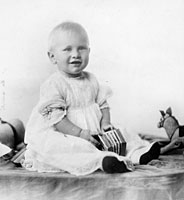
- Leslie Lynch King, Jr.
Dorothy gave birth to Leslie Lynch King Jr. After her husband threatened her and her son with a butcher knife, Dorothy escaped.
In 1915, Dorothy met Gerald Rudolph Ford in Grand Rapids, Michigan. Leslie Lynch King, Jr. became Gerald R. Ford, Jr. Although his stepfather assumed the role of father, he didn’t legally adopt the boy. The family rules were simple:
Tell the truth, work hard, and don’t you dare be late for dinner. . .
Dorothy ran a tight ship. . .chores. . .mandated to help. . .Jerry showed the traits of a natural leader.
Dorothy taught him to control his temper:
You shouldn’t let anger overcome your good judgment.
When he was seventeen-years-old, his birth father “stepped out of the shadows.” When Jerry refused to relocate to Wyoming, the deadbeat father gave him $25:
. . .the first support his father had provided and would have been the last, but for Dorothy’s uncharacteristic reprisal. . .Dorothy was incensed. . .the father who had threatened his infant son with a butcher knife, the man an Omaha court had found guilty of “extreme cruelty,” the deadbeat who had welshed on child-support. . .and alimony. . .King’s wealthy father, Jerry’s grandfather ~ whose fortune by then was estimated at ten million dollars ~ had been sending the monthly check for his irresponsible son, but when the old man died the checks stopped coming. . .Dorothy was by nature a forgiving woman ~ except in this matter, which she would pursue relentlessly.

Ford Wedding, 1948
After graduating from Yale Law School and serving as a Lieutenant Commander in the U.S. Navy in World War II, Jerry opened a law practice in Grand Rapids. Dorothy was eager for her 34-year-old son to get married. He met Betty Bloomer Warren, a divorced dancer/model and fashion coordinator. They were married in the midst of his campaign for Congress in 1948. Dorothy and Betty were devoted to each other.

Jimmy and Lillian Carter
Sometimes when I look at my children, I say to myself,
“Lillian, you should have stayed a virgin.”
– Lillian Carter
Lillian Gordy Carter: Champion for the Under-dog
James Earl Carter, Jr. was the first American president born in a hospital. His mother Miz Lillian was one-of-a-kind:
Full of sass and vinegar, insouciant and irascible, compassionate toward the downtrodden and impatient with the high-and-mighty, Lillian Carter was sui generis. . .she relished being different. . .Lillian Gordy was a girl of the new century. . .a trailblazer, defiant of old shibboleths, ready to accept new thinking. . .the first presidential mother to have a career outside the home. . .nursing was a calling. . .
Lillian and Earl [Jimmy’s father] were a fun-loving couple. They went to dances at the Elks Club, drank a little, and played a little poker, even though Earl was a deacon of Plains Baptist Church. . .they liked to put records on the Victrola and dance. . .
Jimmy quickly learned that if he was engrossed in a book, his mother let him skip chores. . .Lillian taught her son to read little books when he was four, and he never slowed down. Books opened the world to him. . .teachers. . .companions, exciting escapes.
Miz Lillian didn’t cotton to the local church ladies:
They were enthusiastic about sending missionaries to Africa, but they weren’t interested in helping black people right there at home. . .Miss Lillian, wife of one of the biggest farmers in the county, who came into [her Black neighbors’] homes and treated them with dignity. . .Lillian did private duty nursing. . .an innate sense of the injustice, the poverty, and the inequities that gnawed at the human beings consigned to the bottom of the heap.
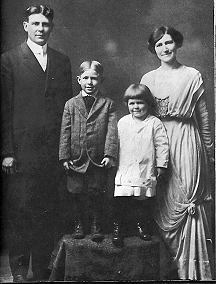
Reagan Family (Ronald next to his mother)
Nelle Wilson Reagan: Director, Producer, and Head of Casting
Ronald “Dutch” Reagan’s mother Nelle Wilson Reagan was an Illinois farm girl with a thirst for the theater. His father John Edward Reagan loved rum, and his failures caused the family to become transients. Like his mother, Dutch craved the spotlight:
She had showed him the magic of pretending, she had sent him on his way. . .her son’s accomplishments had given her a status that her husband could never provide. . .Jack’s alcoholic binges made life uncertain.
. . .the Reagans. . .were most often holding on by the finger-nails to a cracked rung of the middle-class ladder; while Jack was always a white-collar worker, the collar was frayed. . .intrepid Nelle kept up a good front.
Dutch bought his parents a home in California and gave his father a job answering his fan mail. His career, however, wasn’t as successful as his wife’s ~ Jane Wyman. She was granted an uncontested divorce on the grounds of mental cruelty:
Jane charged that her husband was more interested in politics than he was in her. And her movie career was going much better than his.
During the Depression, Jack Reagan became one of the 13 million unemployed. In 1932, he worked on FDR’s campaign:
The Democratic victory brought Jack a personal new deal. For his hard work in FDR’s campaign he was made head of the welfare office in Dixon, then head of the local Works Progress Administration. (The WPA, which put unemployed people to work on public works projects. . .the kind of government program President Reagan would assail.) Democratic patronage also extended to a job for Neil [Reagan’s brother]. . .it saved their lives. . .
As president, he deplored the mind-set that expected the government to take care of people in need; he advocated personal charity, not welfare.
Before Dutch entered politics, his brother Neil was far more successful:
When Ron’s career was in the doldrums. . .Pulling strings at General Electric, Neil landed Ron the job of host and company spokesman on Death Valley Days. . .turning point of the younger brother’s life. He not only hosted the weekly show but gave speeches around the country on behalf of GE. . .converted him from movie actor to public figure and led him into politics.
Ronald Reagan’s first foray into politics was as president of the Screen Actors Guild during the era of the Hollywood Red Hunt. He lead the fight to blacklist leftist union members who sympathized with or belonged to the Communist Party.
Ronald and Nancy Reagan had an enduring marriage, but their children found them to be “emotionally distant.” Nancy stepped into Nelle’s role, but the family was dysfunctional:
Nancy moved to the center of his life as Nelle was fading. To spare her Ronnie every problem, Nancy shouldered the burdens of managing life. . .Nancy quietly exercised more influence over the president’s staff than any First Lady had since President Woodrow Wilson’s wife, Edith, virtually ran the executive office after he was felled by a stroke. . .
Like Nelle, Nancy offered total support, adulation, protection.
At the ends of their lives, Nelle and Dutch both suffered from Alzheimer’s.
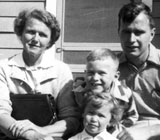
Dorothy (L), George H.W. (R), and George W. Bush (center)
Dorothy Walker Bush: Athletic Prowess and Competitive Spirit
Dorothy Walker Bush could outplay her son George Herbert Walker Bush on the tennis court:
A little humble pie was good for them, in Dorothy’s view; kids who had everything should not boast about anything. . .she, too, had always had everything. . .Don’t whine and complain. Count your blessings. . .Nor did she brook excuses about poor performance. . .She was all about team play. . .
Dorothy lived a charmed life:
From July 1, 1901, until her death ninety-one years later, Dorothy Walker Bush was blessed with a life unmarred by tragedy, unsullied by scandal, unscathed by the Depression. Her family was wealthy and socially prominent in St. Louis and she was pretty and bright. . .Prescott Sheldon Bush. . .was the ideal match for Dorothy Walker.
. . .Life for the Bushes during the Depression was cloudless. . .

- Sen. Prescott and Dorothy Walker Bush
Prescott Bush served two terms as Senator. Unlike Ronald Reagan, he was one of the first senators to speak out against Senator Joe McCarthy and the communist witch hunt. The couple were their children’s biggest boosters:
Dad taught us about duty and service. Mother taught us about dealing with life on a personal basis, relating to other people.
During junior high school, George and his buddies got into hot water for paying two girls ten cents each to run across the room naked. When he was vice president, Dorothy chastised him for his propensity for thoughtlessly leaving his wife Barbara in his wake. When she passed away, George eulogized the mother who had been his polar star:
She was the beacon in our family ~ the center, the candle around which all the moths fluttered ~ she was there, the strength, the center, the power but never arrogance, just love was her strength, kindness her main virtue. . .she taught us to be kind to the other guy, never hurt feelings, love.

Bill Clinton and Virginia Clinton Kelley
Virginia Cassidy Blythe Clinton Dwire Kelley: An American Original
Bill Clinton began life as William Jefferson Blythe III. His father had been tragically killed in a car accident before he was born. His mother Virginia Cassidy Blythe was a registered nurse., but to guarantee her son’s future, she became a nurse anesthetist.
Bill Clinton was reading by the time he was three.
After four years of being a widow, his mother married Roger Clinton over strenuous objections from her family:
“You’re fixin’ to marry a bunch of Buick cars ~ and you’ll have hell from then on.”
. . .ignoring. . .high stakes craps games in his apartment, his first wife’s divorce on grounds of physical abuse, the garnisheeing of his salary to pay court-ordered child support, his vicious attack on a young Puerto Rican in a gambling dispute. . .little Billy was excited to have a father. . .
Bill was the center of Virginia’s universe. He was a golden boy ~ a leader ~ more mature than his classmates. He played tenor saxophone, and Virginia conducted kitchen table conversations with his friends:
Bill got his sense of justice from his mother. She was early in understanding that people without a voice must have someone to speak up for them. She would talk about people who were denied access to the best medical treatment because they didn’t have money. . .a champion for those who have not. . .Virginia treated Bill as an adult, and equal. She respected him. . .Bill was a uniquely gifted young man and wanted to help him have the fullest range of opportunities possible in life.
Roger Clinton was a mean drunk, and Bill became his mother’s protector:
“Hear me. Never. . .ever. . .touch my mother again!”

Richard and Virginia Kelley and Bill Clinton
After the couple divorced, Bill legally changed his name to Clinton. The family dysfunction left its mark:
I had to learn to live with the darker side of life at a fairly early period. . .
I grew up as a peacemaker, always trying to minimize the disruption. People underestimate your resolve because you go out of your way to accommodate them before you drop the hammer.
. . .He would do anything to avoid punishment. It offended his dignity. . .
Virginia Clinton Kelley was blessed to pledge Arkansas’ delegates to her son thereby giving him enough votes to become the Democratic nominee in 1992. Her optimism fueled his reputation as the “comeback kid” during the campaign.

